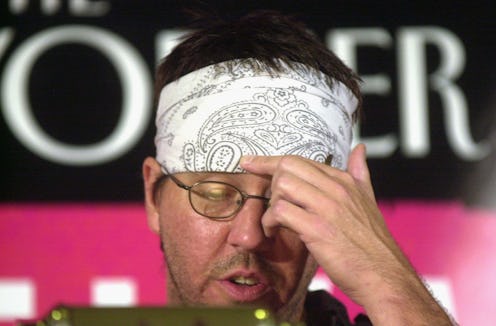Books
David Foster Wallace's Syllabus Is a Must-Read
On Monday, Salon published David Foster Wallace’s creative nonfiction syllabus from the class he taught at Pomona College in the spring of 2008. It’s excerpted from the new book The David Foster Wallace Reader , and it’s a straightforward, funny, sneaky, no-B.S. guide that makes you wish you could have had him as a professor, intimidating as it would have been to stand up and read your latest essay under his watchful gaze. Even the name of the building were the class took place is poetic — Crookshank 101. It sounds like a character in a Dickens novel. Sigh.
Most of us weren’t lucky enough to take his English 183D class, but we can still glean plenty of wisdom about writing, life, and the universe as we know it from his syllabus. (It’s always nice when you’re handed a set of instructions from an author who has been called a literary genius.) And, taking a look, there was plenty to learn, it seems, before the students even got started.
In his 2005 Kenyon College commencement speech, Wallace said, “A huge percentage of the stuff that I tend to be automatically certain of is, it turns out, totally wrong and deluded.” I'll beg to differ about the pearls of wisdom sprinkled throughout his syllabus. See for yourself…
The absolute truth is overrated
David Foster Wallace is not teaching a class on business journalism or war reporting, so in creative nonfiction, the truth is a malleable thing.
“If, for example, a certain event is alleged to have occurred, it must really have occurred,” he writes. On the other hand, “the adjective creative signifies that some goal(s) other than sheer truthfulness motivates the writer and informs her work.”
So, there’s some wiggle room.
Get over yourself
Unless your name is Tina Fey or Beyoncé, no one is dying to hear your life story (your parents don’t count). Don’t assume that people care about you or your life — you have to earn their attention through hard work, discipline, and, in rare cases, by doing something extraordinary.
This applies to writing and to life. You might be telling a story, but: “This does not, however, mean that an essayist’s main goal is simply to ‘share’ or ‘express herself’ or whatever feel-good term you might have got taught in high school.
In the grown-up world, creative nonfiction is not expressive writing, but rather communicative writing.” Even if you’re telling your own story, don’t make it about you — make it about them. Even Tina Fey and Beyoncé spent years working their asses off until people cared. Don’t just talk at people; talk with them.
There are no extensions
If you strolled into English 183D whining about the fact that life isn’t fair and you didn’t finish your essay because people are mean, you’d probably be booted out of Crookshank Hall. Here’s why: “Don’t be late. There are no ‘extensions’ in workshop-type classes; your deadlines are obligations to [12] other adults.”
I love that he put “extensions” in quotes, as if it’s a fairytale concept that belongs in a fictional novel. Basically, do your work, meet your deadlines, and don’t assume you get a free pass.
Read male and female writers in equal measure
Thank you, David Foster Wallace, for including Jo Ann Beard, Donna Steiner, Kathryn Harrison, and Hester Kaplan in your syllabus. His fiction syllabus was equally democratic. Other professors (and human beings in general) should take note.
Don’t be a troll
Internet trolls existed back in 2008, but strangely and sadly, it seems that they’ve multiplied like vicious little gremlins over the last few years. If only they could take a page from Foster’s syllabus and, for a start, skip the cowardly anonymity and use their real names so the people they’re critiquing know who they’re dealing with.
“Make sure that your margin comments are legible and lucid, and that they’re directed to the author; the manuscript copy is not the place to jot notes to yourself. Example: ‘It’s not clear how this sentence supports the conclusion you draw in the next paragraph’ would be OK to write in the margin, whereas ‘Sentence sucks — make sure to ridicule author for this in class’ would not.”
In other words, don’t be a troll.
Images: Getty Images; Giphy
